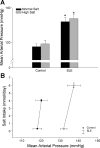Blood pressure in a hypertensive mouse model of SLE is not salt-sensitive
- PMID: 21917908
- PMCID: PMC3213952
- DOI: 10.1152/ajpregu.00386.2011
Blood pressure in a hypertensive mouse model of SLE is not salt-sensitive
Abstract
Systemic lupus erythematosus (SLE) is a risk factor for hypertension. Previously, we demonstrated that an established mouse model of SLE (female NZBWF1 mice) develops hypertension with renal inflammation and oxidative stress, both characteristics known as contributing mechanisms to the development of salt-sensitive hypertension. On the basis of this model, we hypothesized that blood pressure in SLE mice would be salt-sensitive. Thirty-week-old female SLE and control mice (NZW/LacJ) were fed 8% high-salt (HS) diet or normal diet (0.4% salt) for 4 wk. Plasma levels of double-stranded DNA (dsDNA) autoantibodies, a marker of SLE disease activity, were increased in SLE mice compared with controls (472 ± 148 vs. 57 ± 17 U/ml × 1,000, P < 0.001). HS did not alter dsDNA autoantibody levels in SLE or control mice. Mean arterial pressure was increased in SLE mice compared with controls (132 ± 3 vs. 118 ± 2 mmHg, P < 0.001) and was not significantly altered by the HS diet in either group. Similarly, albuminuria was higher in SLE mice compared with controls (10.7 ± 9.0 vs. 0.3 ± 0.1 mg/day) but was not significantly increased in SLE or control mice fed a HS diet. In summary, blood pressure during SLE is not salt-sensitive, and the HS diet did not adversely affect SLE disease activity or significantly augment albuminuria. These data suggest that renal inflammation and oxidative stress, characteristics common to both SLE and models of salt-sensitive hypertension, may have diverging mechanistic roles in the development of hypertension.
Figures



Similar articles
-
Understanding mechanisms of hypertension in systemic lupus erythematosus.Ther Adv Cardiovasc Dis. 2016 Mar 15;11(1):20-32. doi: 10.1177/1753944716637807. Online ahead of print. Ther Adv Cardiovasc Dis. 2016. PMID: 26985016 Free PMC article. Review.
-
Blood pressure and albuminuria in a female mouse model of systemic lupus erythematosus: impact of long-term high salt consumption.Am J Physiol Regul Integr Comp Physiol. 2020 Oct 1;319(4):R448-R454. doi: 10.1152/ajpregu.00070.2020. Epub 2020 Aug 19. Am J Physiol Regul Integr Comp Physiol. 2020. PMID: 32813539 Free PMC article.
-
Hypertension in an experimental model of systemic lupus erythematosus occurs independently of the renal nerves.Am J Physiol Regul Integr Comp Physiol. 2013 Oct 1;305(7):R711-9. doi: 10.1152/ajpregu.00602.2012. Epub 2013 Aug 7. Am J Physiol Regul Integr Comp Physiol. 2013. PMID: 23926131 Free PMC article.
-
Temporal hemodynamic changes in a female mouse model of systemic lupus erythematosus.Am J Physiol Renal Physiol. 2020 May 1;318(5):F1074-F1085. doi: 10.1152/ajprenal.00598.2019. Epub 2020 Mar 9. Am J Physiol Renal Physiol. 2020. PMID: 32150445 Free PMC article.
-
The pathophysiology of hypertension in systemic lupus erythematosus.Am J Physiol Regul Integr Comp Physiol. 2009 Apr;296(4):R1258-67. doi: 10.1152/ajpregu.90864.2008. Epub 2009 Jan 21. Am J Physiol Regul Integr Comp Physiol. 2009. PMID: 19158408 Free PMC article. Review.
Cited by
-
Plasma Cell Depletion Attenuates Hypertension in an Experimental Model of Autoimmune Disease.Hypertension. 2018 Apr;71(4):719-728. doi: 10.1161/HYPERTENSIONAHA.117.10473. Epub 2018 Jan 29. Hypertension. 2018. PMID: 29378858 Free PMC article.
-
Understanding mechanisms of hypertension in systemic lupus erythematosus.Ther Adv Cardiovasc Dis. 2016 Mar 15;11(1):20-32. doi: 10.1177/1753944716637807. Online ahead of print. Ther Adv Cardiovasc Dis. 2016. PMID: 26985016 Free PMC article. Review.
-
Blood pressure and albuminuria in a female mouse model of systemic lupus erythematosus: impact of long-term high salt consumption.Am J Physiol Regul Integr Comp Physiol. 2020 Oct 1;319(4):R448-R454. doi: 10.1152/ajpregu.00070.2020. Epub 2020 Aug 19. Am J Physiol Regul Integr Comp Physiol. 2020. PMID: 32813539 Free PMC article.
-
Autoimmunity: an underlying factor in the pathogenesis of hypertension.Curr Hypertens Rep. 2014 Apr;16(4):424. doi: 10.1007/s11906-014-0424-1. Curr Hypertens Rep. 2014. PMID: 24535221 Free PMC article. Review.
-
Systemic Administration of α7-Nicotinic Acetylcholine Receptor Ligands Does Not Improve Renal Injury or Behavior in Mice With Advanced Systemic Lupus Erythematosus.Front Med (Lausanne). 2021 Apr 13;8:642960. doi: 10.3389/fmed.2021.642960. eCollection 2021. Front Med (Lausanne). 2021. PMID: 33928103 Free PMC article.
References
-
- Al-Herz A, Ensworth S, Shojania K, Esdaile JM. Cardiovascular risk factor screening in systemic lupus erythematosus. J Rheumatol 30: 493–496, 2003 - PubMed
-
- Ba D, Takeichi N, Kodama T, Kobayashi H. Restoration of T cell depression and suppression of blood pressure in spontaneously hypertensive rats (SHR) by thymus grafts or thymus extracts. J Immunol 128: 1211–1216, 1982 - PubMed
-
- Budman DR, Steinberg AD. Hypertension and renal disease in systemic lupus erythematosus. Arch Intern Med 136: 1003–1007, 1976 - PubMed
-
- Cordain L, Eaton SB, Sebastian A, Mann N, Lindeberg S, Watkins BA, O'Keefe JH, Brand-Miller J. Origins and evolution of the Western diet: health implications for the 21st century. Am J Clin Nutr 81: 341–354, 2005 - PubMed
Publication types
MeSH terms
Substances
Grants and funding
LinkOut - more resources
Full Text Sources
Medical

